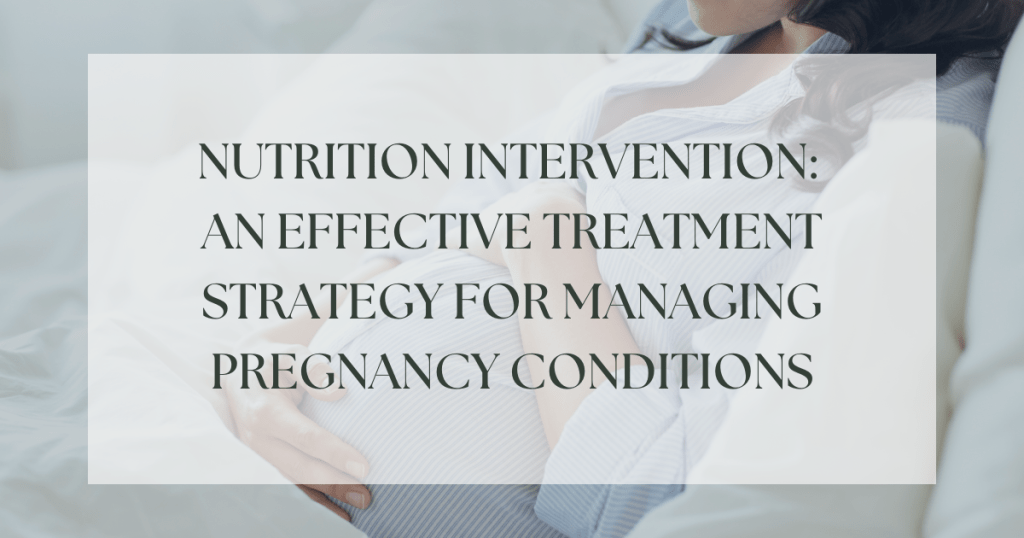Pregnancy is a transformative and awe-inspiring journey filled with countless physical and emotional changes. During this time nutrition intervention plays a crucial role in supporting the health and well-being of both the mother and the growing baby. In this blog post, we will explore the truth behind nutrition interventions as effective treatments for common pregnancy conditions. From gestational diabetes to high blood pressure and anemia, we will uncover the research-backed evidence supporting the use of nutrition interventions as a first-line approach in managing and treating these conditions.
The Role of Nutrition Intervention:
Nutrition intervention involves making targeted dietary modifications to address specific health concerns. It can be used as a standalone treatment or in conjunction with other medical therapies. In the context of pregnancy conditions, nutrition intervention aims to optimize nutrient intake, promote healthy weight management, and support overall well-being.
Gestational Diabetes:
Gestational diabetes is a condition characterized by high blood sugar levels during pregnancy. While medication may be prescribed in some cases, nutrition interventions are often the first line of treatment. A well-balanced meal plan focusing on adequate carbohydrate intake, portion control, and blood sugar management can help stabilize blood sugar levels and promote a healthy pregnancy outcome. Research has shown that nutrition interventions, combined with regular physical activity, can effectively manage gestational diabetes and reduce the risk of complications.
High Blood Pressure:
Hypertension, or high blood pressure, is another common pregnancy condition that requires careful management. While medication may be necessary in certain situations, nutrition interventions are often prescribed as a primary treatment strategy. A nutrient-rich diet, low in sodium and processed foods, can help regulate blood pressure levels and promote cardiovascular health. Hydration, stress management techniques, and regular physical activity further contribute to optimal blood pressure control.
Gestational Anemia:
Gestational anemia, characterized by low levels of red blood cells or hemoglobin, can affect both the mother and the developing baby. Nutrition interventions are key in managing and preventing anemia during pregnancy. A diet rich in iron, obtained from sources such as leafy greens, lean meats, and fortified cereals, helps replenish iron stores and supports healthy blood production. Pairing iron-rich foods with vitamin C-rich options enhances iron absorption. Nutritional supplementation may also be recommended in some cases to meet the increased demands of pregnancy.
Other Pregnancy Conditions:
Nutrition interventions are not limited to gestational diabetes, high blood pressure, and anemia. They play a vital role in managing and treating various other pregnancy-related conditions. From nausea and morning sickness to digestive issues and hormonal imbalances, proper nutrition can alleviate symptoms and promote overall well-being. In some cases, specific dietary modifications, such as small, frequent meals and the inclusion of ginger-based remedies, can help manage common pregnancy discomforts.
The Evidence Supporting Nutrition Intervention:
Numerous studies have highlighted the effectiveness of nutrition intervention in managing pregnancy conditions. Research has shown that targeted dietary modifications can help stabilize blood sugar levels in gestational diabetes, control blood pressure in hypertensive disorders, and improve iron levels in anemic individuals. Furthermore, nutrition intervention has been associated with improved maternal and fetal outcomes, reducing the risk of complications and promoting optimal health during pregnancy.
Nutrition intervention has emerged as a powerful and evidence-based strategy for managing common pregnancy conditions. By working closely with healthcare professionals, including registered dietitians, pregnant individuals can receive personalized guidance and support to optimize their nutrition and overall well-being. Whether it’s controlling blood sugar levels, managing blood pressure, or improving iron status, nutrition intervention can play a key role in promoting a healthy pregnancy journey.
Remember, every pregnancy is unique, and it’s important to consult with your healthcare provider before making any dietary changes or starting a nutrition intervention plan. Together, we can unlock the potential of nutrition intervention to support a healthy and thriving pregnancy.


